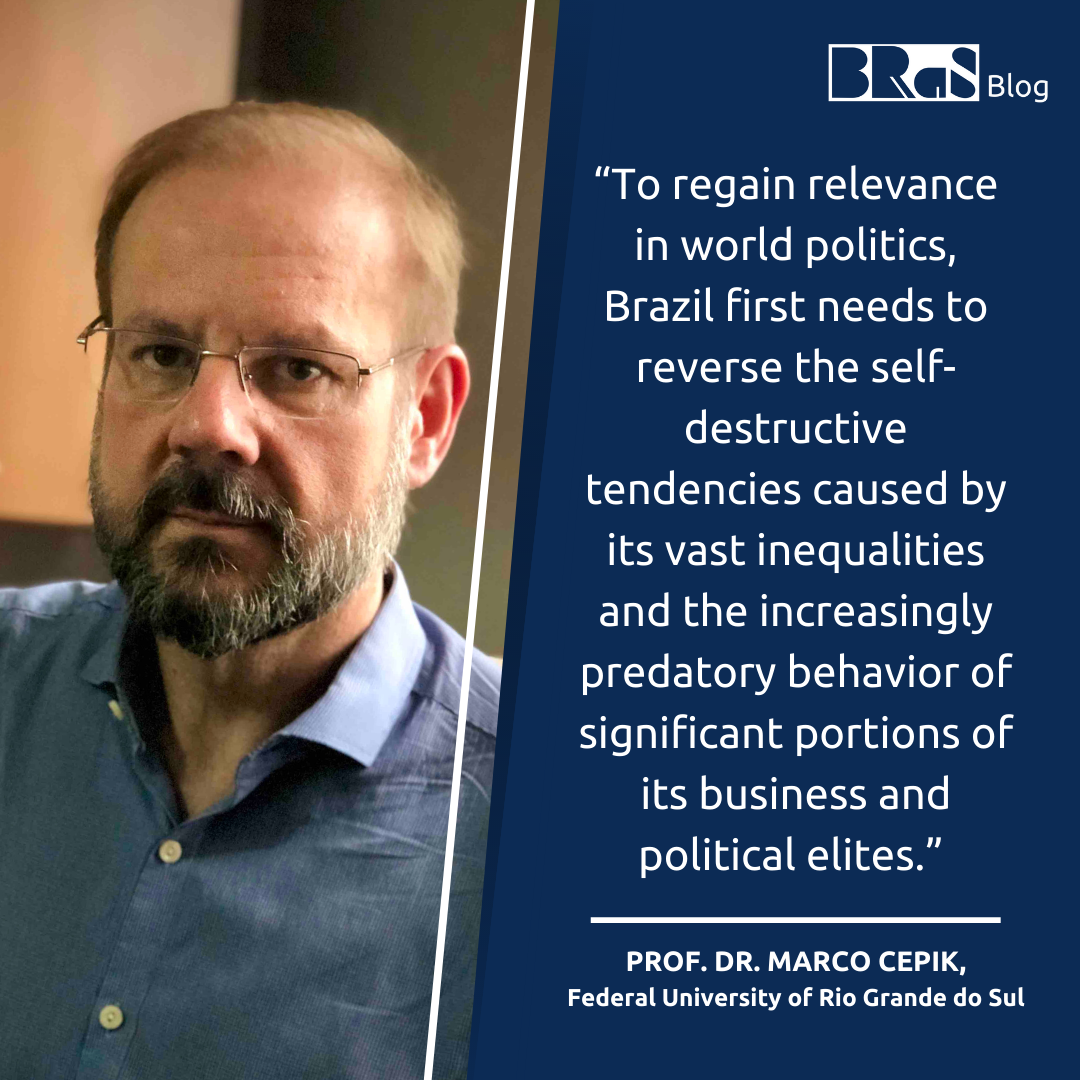by Vinícius Alves Scherch
Edited and reviewed by Giovanna Imbernon
In 1988, Brazil had a formal break with the military dictatorship regime but has not yet achieved full democracy. It is true to say that the Constitution of 1988 (CF88) is a paradigm, as it establishes a new legal order conformed to the political thought forcing a normative transition from a Constitution to a more adequate one. If we consider the constituent power as being the source of the new Constitution, we may say that it was unlimited, autonomous, and unconditional (Sieyès: 1973), finding its limits in natural law, and belonging to the people – creator of the State and founder of the constituted power (limited and conditioned).
Carl Schmitt (1996), in turn, points out that the constituent power is the result of a political decision and component of this political will, expressed in and as the State, and in its actions, giving rise to the Constitution.
This constituent power belongs to the people, who, incidentally, is also part of the State, and will be responsible for inaugurating a new constitutional order. Therefore, it is noticeable that a Constitution is born from the constituent power; something much more complex than just a rupture, a revolution, or an exchange. Antonio Negri, when wrote about the constituent power, stated that it is a process that “accumulates to be qualitatively and quantitatively; it always occupies new spaces, builds” (Negri, 1993: 350) and that “the time that is proper to the constituent power, a time endowed with a formidable capacity for acceleration, time of emergence and generalization of singularity, should be closed, detained, reduced in the legal categories, restricted in the administrative routine” (Negri, 1994: 18). Based on that, constituent power and democracy are correlated, not reduced to the qualification or recognition of constitutional norms and organization of constituted powers, but implies an integrated understanding, i. e., it is an ambiguous source identity and the subject of the Constitution (Alves, 2013: 269-270).
The constituent power has no place within the normative order, except after the Constitution, but this power assumes a passive or limited position since its controlling source is the political charter itself. Therefore, the derived constituent power needs to respect the dictates of the Constitution, precisely in terms of possible reforming and amendments to the primary text. Although the Constitution intended to be eternal, is not immutable (Araujo & Nunes Jr, 2016: 43). We need to understand that the Constitution needs to be both safe and up-to-date – under penalty of not serving the social purpose intended – and how those changes need to be rigid to ensure constitutional awareness (Loewenstein, 1979) and curb its anti-democratic attacks in its reformulations. Strong mechanisms were designed for the amendment process (art. 60 of the CF88), with a qualified quorum, circumstantial and procedural prohibitions, ensuring alterations are minimally qualitative, engendering substantial limits to the Power of Amendment:
“Limitation to the constitutional reform represents the very idea of constitutional supremacy and the resulting duality of democratic politics, as this tool enables to identify the constitutional norm and its differentiation from infra-constitutional political acts. Despite their importance for the structure of a dualist constitutional order, procedural restrictions are not the only ones to exert some kind of influence on the derived constituent power, as the substantial contents, when elected by the original constituent power, also seek to perform the same functions. By providing protective clauses, the original constituent power determines that the initial constitutional project is not open to any changes. Such limits, therefore, seek conciliation between the antagonism of the impulses of permanence and change in the constitution, through the provision of conditioned freedom (Lima, 2018: 132-133).”
One way to update the text of the Constitution without changing its structure is open writing, through which one can understand contexts and keep the rules contemporary. As pointed out by Konrad Hesse: “from the perspective of the Constitution over time, the Constitution can only fulfill its tasks where it can, under changed circumstances, preserve its normative force, that is, where it can guarantee its continuity without prejudice to historical transformations, which presupposes the conservation of their identity” (Hesse, 2009: 10). That’s why it can be said that:
“The Constitution is an unfinished project of society. It is an open text and is always open to changes – a result of the community’s social and cultural movement for which it is intended, producing and instructing the norms. Within this framework, the Constitution remains contemporary by changing the text and the interpretive activity that aims to adapt the norm to the facts of life. (Scherch, 2020: 19).”
In this way, it is not only through amendments that the Constitution is altered but also through the interpretation of its terms, having the interpretation a major role – mostly performed by the Judiciary and with more strength, authority by the Supreme Court.
Some more questions come up, either because a Constitutional Court cannot do everything or because “even if the Court is competent to fix the content of the Constitution, with binding effectiveness, it is not above the Constitution to which it owes its existence” (Hesse, 1983: 36), either because everyone in society is a potential interpreter of the Constitution and cannot have this role relegated (Häberle, 1997: 12-13). Therefore, the interpretation also stands as a possibility to update the Constitution, since “it is possible to talk about creating a solution to a certain case, without necessarily implying the creation of the Law – or a new one. It is important to observe the controllable creation criterion, since the Constitution reveals itself above interpretation and, therefore, the will of interpreters” (Alves; Scherch, 2020: 150).
There is room to address the mutation and transmutation of the Constitution. First, observing the mutation, it can be said that it is a process by which the meaning of the constitutional text is changed without changing its form. No changes in what is written, but in its meaning. In turn, “constitutional transmutation has as its main form of assessment the excessive use of means of exception and coercion, bringing about a situation of elimination of multiple conceptions, implicitly causing the erosion of fundamental rights and access to the policy” (Martinez & Scherch, 2020: 183).
We may notice that when building the Constitution, Brazilian constitutionalism did not give people the opportunity to participate in and assess the satisfaction to a democratic rule of law; popular participation is limited by the complications of popular initiative regarding the laws and demonstrations in public hearings, and also in – underused – referendums and plebiscites. The people do no participate in the constitutional amendment process, neither in a more direct interpretive activity. We may say that:
The meaning of the Constitution must be collectively constructed and defined by the people and the institutions of their society. Therefore, it is true that the Judiciary has a fundamental role in defining the constitutional legal interpretation and enforcement, but the constitution cannot be only implemented based on judge’s and court’s interpretations. On the contrary, the constitution can only be fully apprehended through democratic politics. The Constitutional State was achieved through the fight against the lack of the rule of law. This fight continues with democracy, which must be fulfilled daily in the realization of fundamental rights because it, together with popular sovereignty, presupposes the ownership of the power of the State, which, in the final analysis, resides in the people. (Godoy, 2017: 110)
In the 21st century, no Constitution is perfect, but one must defend its text and axiology not only for the sake of principles but for considering that the complexity of society broadens and people’s politics tend to be forgotten:
“The price that constitutionalism imposes on a perfect Constitution is its immutability and consequently, the same rigidity that keeps it as a higher law is what puts it out of step with people’s will. Here lies the question of radicality: in the recognition that the Constitution is the people’s expression, otherwise it would not be a Constitution (Scherch, 2019: 112).”
The fact of having a rigid and difficult-to-change Constitution – beneficial which in times of peace than in times of war – does not guarantee its loyalty to social concerns. The opposite is also true because, in a flexible constitutional scenario, the people are subject to the will of those in power and any change can be imposed. By the way, this is why provisional measures should not be used to govern and the judicialization of politics should not replace judicial activism and the politicization of justice.
In sum, we cannot say that in 2021 the Constitution of 1988 remains the same. Amendments and different interpretations eroded both its text and conscience. For example, the Constitutional Amendment (EC) 16/1997 allowing re-election, the EC 109/2021 promoting the constitutionalization of the state of emergency, bringing over rules for a state of exception in the Constitution. Likewise, it cannot be said that the 1988 Constitution was superseded by an informal constitution during the process of changes that culminate in the Constitutional State that is observed in 2021, that is, traces of the original identity managed to remain preserved, in which although they are not applied by the Public Power for reasons of merit that the myriads try to justify the popular distancing.
It is necessary to think about criteria and not interests, the Constitution only exists and resists if in the legal-political-cultural process it is understood in its values and respected by people. Complying with and defending the Constitution is not a result of fear of a sanctioning precept, but it is an act of respect that drives the civilizing process.
References
Alves, Fernando de Brito & Scherch, Vinicius (2020). Considerações acerca da interpretação e primeiras ideias sobre uma teoria da decisão. Revista Direito em Debate, [S.L.], v. 29, n. 53, p. 141-152, 26 maio 2020. Editora Unijui. http://dx.doi.org/10.21527/2176-6622.2020.53.141-152.
Alves, Fernando de Brito (2013). Constituição e participação popular: a construção histórico-discursiva do conteúdo jurídico-político da democracia como direito fundamental. Curitiba: Juruá.
Godoy, Miguel Gualano (2017). Devolver a constituição ao povo: crítica à supremacia judicial e diálogos institucionais. Belo Horizonte.
Häberle, Peter (1997). Hermenêutica constitucional – a sociedade aberta dos intérpretes da constituição: contribuição para a interpretação pluralista e “procedimental” da Constituição. Porto Alegre: Sergio Antonio Fabris Editor. Translation by Gilmar Ferreira Mendes.
Hesse, Konrad (1983). Escritos de derecho constitucional. Introducción y traducción Pedro Cruz Villalón. Madrid: Centro de Estudios Constitucionales.
Hesse, Konrad (2009). Temas fundamentais do Direito Constitucional. Textos selecionados e traduzidos por Carlos dos Santos Almeida, Gilmar Ferreira Mendes e Inocêncio Mártires Coelho. São Paulo: Saraiva.
Lima, Jairo (2018). Emendas constitucionais inconstitucionais: democracia e supermaioria. Rio de Janeiro: Lumen Juris.
Loewenstein, Karl (1979). Teoria de la constituición.. Barcelona: Editora Ariel. Translation by Eduardo Espin.
Martinez, Vinício Carrilho & Scherch, Vinícius Alves (2020). Mutação ou Transmutação Constitucional, o tendencionismo à opinião pública como obstáculo aos Direitos Fundamentais. Revista Juris Poiesis, [S.L.], v. 31, n. 23, p. 174-196, abril.
Negri, Antonio (1993). La anomalía salvaje. Ensayo sobre poder y potencia en B. Spinoza. Anthropos. Mexico, Universidad Autónoma Metropolitana: Editorial del Hombre.
Negri, Antonio (1994). El poder constituyente: Ensayo sobre las alternativas de la modernidad. Madrid: Libertarias Prodhufi.
Scherch, Vinícius Alves (2019). As pessoas e a Constituição: Crítica ao direito positivado e à justiça simbólica no processo político-judicial. In: Alvim, E. A.; Cachichi, R. C. D.; Pugliesi, R. C. M.; Silva, F. Q. da. (Eds.) Direitos humanos e processo: estudos em homenagem ao Prof. Dr. Gilberto Giacoia. Curitiba: Instituto Memória, p. 106-121.
Scherch, Vinícius Alves (2020). Teoria da decisão judicial: influências das posições jusfilosóficas no cenário jurídico-político brasileiro. Londrina, PR: Thoth.
Schmitt, Carl (1996). Teoría de la Constitución. Madrid: Alianza Editorial. Translation by Francisco Ayala
Sieyès, Emmanuel Joseph (1973). ¿Qué és el tercer Estado? Madrid: Aguilar.
Vinícius Alves Scherch is a Ph.D. candidate in Science, Technology, and Society (STS) at the Federal University of São Carlos (UFSCar) and a member of BRaS’s Constitutional Studies RG.








